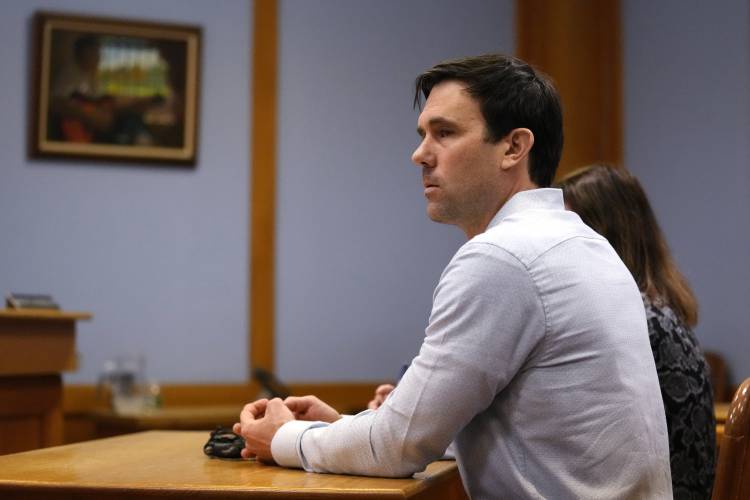Editorial: Parker parole a reminder of how violence reshapes our lives

James Parker listens to the parole board decision during his parole hearing, Thursday, April 18, 2024, in Concord, N.H. Parker, who served more than half of his life in prison for his role in the 2001 stabbing deaths of two married Dartmouth College professors as part of a plan to rob and kill people before fleeing overseas has been granted parole.(AP Photo/Charles Krupa) Charles Krupa
|
Published: 04-26-2024 10:01 PM
Modified: 04-29-2024 8:59 AM |
The murders of Half and Susanne Zantop in 2001 not only imposed untold and unending grief on the family, friends and Dartmouth colleagues of the two professors, but also altered the psyche of the Upper Valley in ways perhaps not fully understood even now.
Thus it would be only natural if the recent news that James Parker has been granted parole after serving nearly 24 years in prison for his role in the killings aroused at least ambivalent emotions. Yet, if you believe in the possibility of human redemption — and we do — then Parker’s impending release is a testament to its transformative power.
Parker was only 16 years old at the time of the crime, which he committed in tandem with his best friend and Chelsea high school classmate, then-17-year-old Robert Tulloch. They had concocted a plan — or more accurately, a fantasy — to relieve the boredom of their small-town lives by committing armed robbery and murder to secure the $10,000 they estimated they would need to travel to Australia.
After gaining entry to the Zantops’ Hanover home on a pretext of doing an environmental survey, they wielded knives to murder the couple in an act of unbridled savagery. Parker eventually pleaded guilty to second-degree murder and agreed to testify against Tulloch, who in turn pleaded guilty to first-degree murder.
When he went before the state Parole Board earlier this month, Parker, now 39, had served nearly the minimum term of his 25-years-to-life sentence. To his credit, Parker did not compound the awful tragedy he inflicted by wasting his life and his time behind bars. By all accounts, he was a model prisoner intent on leading a purposeful life. He earned a bachelor’s degree and a master’s degree with a concentration in nonprofit leadership. He also found a creative outlet in painting; developing inmate education guides; and participating in theater, music and sports.
His testimony before the Parole Board suggests that the monstrous act he committed is as inconceivable to him now as it is to others and that his 16-year-old self is a mystery to the mature man he has become.
“Why did you do that?” he was asked.
“It’s just so hard,” Parker replied. “I’ve gone over and over it and just finding an explanation for that is just, I just don’t know how I could do that.” Probably he never will, but at least he now has the opportunity to try to atone for it by leading a useful life in service to others. He plans to live in Somersworth, N.H., following his release and told the Parole Board that he has a network of family and friends to provide support and advice.
Article continues after...
Yesterday's Most Read Articles
The resurfacing of this crime and its aftermath also affords an opportunity to take stock of how it changed the Upper Valley. Violent crime was certainly not unknown before then, but the random and brutal nature of the murders, committed in Hanover, the safest of the Upper Valley’s safe places, profoundly altered the collective consciousness. Parker alluded to this himself before the Parole Board. “My parents never locked their doors before this happened, and they started” doing so afterward, like many other people in the area, he testified.
That locking of doors was a recognition that the world — even the world of rural Vermont and New Hampshire — had become a dangerous place, one where you trust strangers at your peril. This sobering lesson about the possibility of unanticipated, shocking violence would be reinforced nine months later on a much bigger stage during the 9/11 attacks on the United States.
Time, of course, does not heal all wounds. But it does provide an opportunity for reflection and renewal. The last and best word belongs to Veronika Zantop, one of the Zantops’ two daughters. She told our colleague John Lippman that her emotions have evolved with the perspective the intervening years have afforded.
“Since it happened, I’ve become a mother. I’ve become a psychiatrist,” she said. “And I realized that the world is complex and teenagers are complex. And maybe some of the thoughts I had at the time have changed, in terms of compassion for his family and even him at age 16 doing something terrible.”

 Editorial: Response to campus protests only adds fuel to the fire
Editorial: Response to campus protests only adds fuel to the fire Editorial: Chris Sununu’s moral vacuum
Editorial: Chris Sununu’s moral vacuum Editorial: Gambling tarnishes America’s sporting life
Editorial: Gambling tarnishes America’s sporting life By the Way: A white nationalist’s many mistruths
By the Way: A white nationalist’s many mistruths
